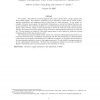Free Online Productivity Tools
i2Speak
i2Symbol
i2OCR
iTex2Img
iWeb2Print
iWeb2Shot
i2Type
iPdf2Split
iPdf2Merge
i2Bopomofo
i2Arabic
i2Style
i2Image
i2PDF
iLatex2Rtf
Sci2ools
82
Voted
COR
2008
2008
Supply disruptions with time-dependent parameters
We consider a firm that faces random demand and receives product from a single supplier who faces random supply. The supplier's availability may be affected by events such as storms, strikes, machine breakdowns, and congestion due to orders from its other customers. In our model, we consider a dynamic environment: the probability of disruption, as well as the demand intensity, can be time dependent. We model this problem as a two-dimensional non-homogeneous continuous-time Markov chain (CTMC), which we solve numerically to obtain the total cost under various ordering policies. We propose several such policies, some of which are time dependent and others of which are not. The key question we address is: How much improvement in cost is gained by using time-varying ordering policies rather than stationary ones? We compare the proposed policies under various cost, demand, and disruption parameters in an extensive numerical study. In addition, motivated by the fact that disruptions ar...
| Added | 09 Dec 2010 |
| Updated | 09 Dec 2010 |
| Type | Journal |
| Year | 2008 |
| Where | COR |
| Authors | Andrew M. Ross, Ying Rong, Lawrence V. Snyder |
Comments (0)

